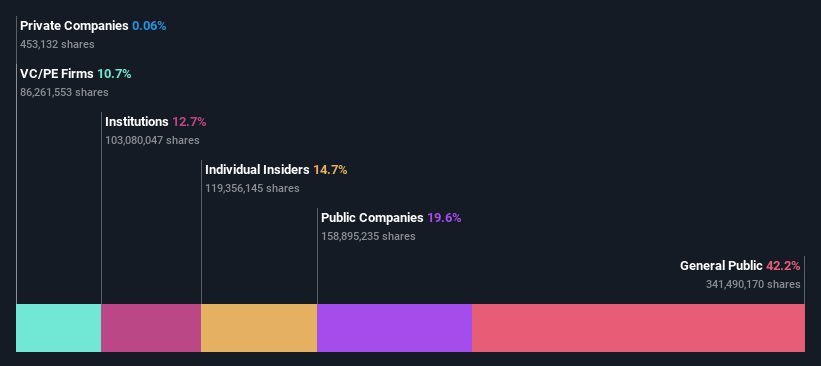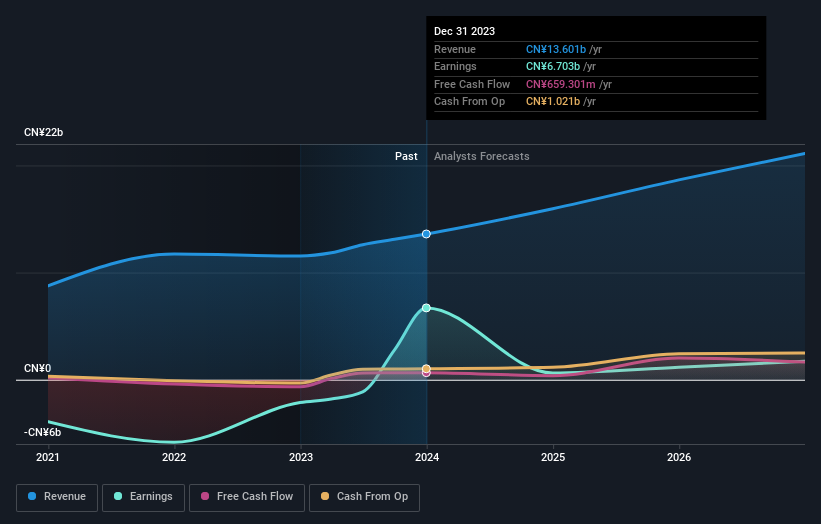- Hong Kong
- /
- Commercial Services
- /
- SEHK:9690
Retail investors among TUHU Car Inc.'s (HKG:9690) largest stockholders and were hit after last week's 5.3% price drop

Key Insights
- The considerable ownership by retail investors in TUHU Car indicates that they collectively have a greater say in management and business strategy
- The top 7 shareholders own 53% of the company
- Insider ownership in TUHU Car is 15%
To get a sense of who is truly in control of TUHU Car Inc. (HKG:9690), it is important to understand the ownership structure of the business. And the group that holds the biggest piece of the pie are retail investors with 42% ownership. In other words, the group stands to gain the most (or lose the most) from their investment into the company.
And following last week's 5.3% decline in share price, retail investors suffered the most losses.
Let's delve deeper into each type of owner of TUHU Car, beginning with the chart below.
See our latest analysis for TUHU Car

What Does The Institutional Ownership Tell Us About TUHU Car?
Institutional investors commonly compare their own returns to the returns of a commonly followed index. So they generally do consider buying larger companies that are included in the relevant benchmark index.
We can see that TUHU Car does have institutional investors; and they hold a good portion of the company's stock. This suggests some credibility amongst professional investors. But we can't rely on that fact alone since institutions make bad investments sometimes, just like everyone does. When multiple institutions own a stock, there's always a risk that they are in a 'crowded trade'. When such a trade goes wrong, multiple parties may compete to sell stock fast. This risk is higher in a company without a history of growth. You can see TUHU Car's historic earnings and revenue below, but keep in mind there's always more to the story.

TUHU Car is not owned by hedge funds. Looking at our data, we can see that the largest shareholder is Tencent Holdings Limited with 20% of shares outstanding. With 8.5% and 5.9% of the shares outstanding respectively, Min Chen and Fidelity International Ltd are the second and third largest shareholders. Min Chen, who is the second-largest shareholder, also happens to hold the title of Chief Executive Officer.
We did some more digging and found that 7 of the top shareholders account for roughly 53% of the register, implying that along with larger shareholders, there are a few smaller shareholders, thereby balancing out each others interests somewhat.
While studying institutional ownership for a company can add value to your research, it is also a good practice to research analyst recommendations to get a deeper understand of a stock's expected performance. There are a reasonable number of analysts covering the stock, so it might be useful to find out their aggregate view on the future.
Insider Ownership Of TUHU Car
The definition of an insider can differ slightly between different countries, but members of the board of directors always count. The company management answer to the board and the latter should represent the interests of shareholders. Notably, sometimes top-level managers are on the board themselves.
Insider ownership is positive when it signals leadership are thinking like the true owners of the company. However, high insider ownership can also give immense power to a small group within the company. This can be negative in some circumstances.
It seems insiders own a significant proportion of TUHU Car Inc.. It is very interesting to see that insiders have a meaningful HK$3.0b stake in this HK$20b business. Most would be pleased to see the board is investing alongside them. You may wish to access this free chart showing recent trading by insiders.
General Public Ownership
The general public-- including retail investors -- own 42% stake in the company, and hence can't easily be ignored. While this size of ownership may not be enough to sway a policy decision in their favour, they can still make a collective impact on company policies.
Private Equity Ownership
With an ownership of 11%, private equity firms are in a position to play a role in shaping corporate strategy with a focus on value creation. Sometimes we see private equity stick around for the long term, but generally speaking they have a shorter investment horizon and -- as the name suggests -- don't invest in public companies much. After some time they may look to sell and redeploy capital elsewhere.
Public Company Ownership
It appears to us that public companies own 20% of TUHU Car. It's hard to say for sure but this suggests they have entwined business interests. This might be a strategic stake, so it's worth watching this space for changes in ownership.
Next Steps:
It's always worth thinking about the different groups who own shares in a company. But to understand TUHU Car better, we need to consider many other factors. Case in point: We've spotted 3 warning signs for TUHU Car you should be aware of, and 1 of them is significant.
If you would prefer discover what analysts are predicting in terms of future growth, do not miss this free report on analyst forecasts.
NB: Figures in this article are calculated using data from the last twelve months, which refer to the 12-month period ending on the last date of the month the financial statement is dated. This may not be consistent with full year annual report figures.
Valuation is complex, but we're here to simplify it.
Discover if TUHU Car might be undervalued or overvalued with our detailed analysis, featuring fair value estimates, potential risks, dividends, insider trades, and its financial condition.
Access Free AnalysisHave feedback on this article? Concerned about the content? Get in touch with us directly. Alternatively, email editorial-team (at) simplywallst.com.
This article by Simply Wall St is general in nature. We provide commentary based on historical data and analyst forecasts only using an unbiased methodology and our articles are not intended to be financial advice. It does not constitute a recommendation to buy or sell any stock, and does not take account of your objectives, or your financial situation. We aim to bring you long-term focused analysis driven by fundamental data. Note that our analysis may not factor in the latest price-sensitive company announcements or qualitative material. Simply Wall St has no position in any stocks mentioned.
About SEHK:9690
TUHU Car
Primarily operates as an integrated online and offline platform for automotive services in China.
Undervalued with excellent balance sheet.

